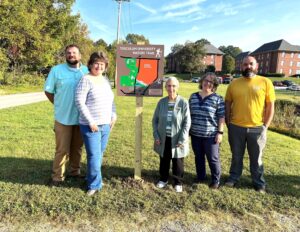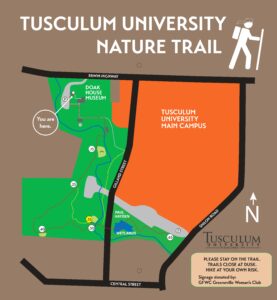GREENEVILLE – One of the newest amenities for the Tusculum University family and the community to use on campus is receiving a boost from a local civic club.

Left to right, Jordan Baker, Kim Carter, Pat Barnett, Dr. Heather Henson-Ramsey and Dr. Peter Noll stand by one of the new signs. This one is located at the Paul E. Hayden Wetland.
The Greeneville Woman’s Club recently provided the funds for Tusculum to purchase two signs for the university’s nature trail, which runs between the Doak House Museum and the Paul E. Hayden Educational Wetland. The signs contain maps of the trail. Pat Barnett, co-chair of the environment department within the club, hopes the donation will spur greater awareness of the trail.
“I have walked part of the trail and find it to be an enjoyable recreational opportunity available to everyone in the community,” Barnett said. “It’s a nice trail and a wonderful place for families to spend time outdoors.”
Started three years ago, opened two years ago and completed a month ago, the nature trail is open year-round for anyone at the university or from the community to use. It runs from the restroom at the Doak House to the Hayden wetland.
The trail consists of two routes. One rises in elevation before descending to College Creek, while the other stays on a fairly level grade. The rise in elevation in the first route is quite manageable. Hiking in the nature trail enables the person to experience the calming sound of running water and perhaps stop and explore some of the habitats there.
A round trip from the Doak House to the Hayden wetland is about a mile.
Barnett said the idea for supporting the trail with signage arose when Kim Carter, Tusculum’s chemical hygiene officer, Environmental Protection Agency coordinator and lab assistant, made a presentation about the Tusculum arboretum at a Greeneville Woman’s Club meeting. Afterward, the club decided it wanted to assist with signage on campus.
The club has five departments, and one of them promotes the importance of enjoying the outdoors and taking care of the environment. Helping with the trail was a natural fit for the club. After some discussion between the club and Dr. Peter Noll, professor of public history and museum studies, who oversees the trail, and Jordan Baker, assistant professor of biology, the conclusion was that signs for the trail would be the best plan.
“We’re grateful to the Greeneville Woman’s Club for its support of our trail and encouragement of outdoor activity,” Dr. Noll said. “Creating the trail has been a great addition to the campus and an enhancement of the community’s quality of life. We encourage the community to use the trail as much as possible and enjoy the trees and creek along the routes.”

This is a picture of one of the signs.
The trail has taken shape under the leadership of Dr. Noll and Baker, who have received assistance from students, faculty and staff on a variety of volunteer work days as well as during Tusculum’s annual Nettie Fowler McCormick Service Day. In addition, participants in Leadership Greene County cut a major section of the trail during a volunteer work day.
In August, Micah Gall, a member of Boy Scout Troop 92 in Greeneville, installed a boardwalk, with 15 sections, in a portion of the trail that tends to stay wetter than other spots. He also put 10 birdhouses through the trail and wetlands. All of this was a project he completed as part of his pursuit of Eagle Scout designation.
The boardwalk’s purpose is to help hikers’ feet stay as dry as possible, preserve a nearby vernal pond and protect a transitional wetland and the species that could otherwise be negatively impacted.
In that space, two Tusculum students – Joe Calloway and Breanna Mathes – discovered a potential new crayfish species in February. The Tennessee Wildlife Resources agency has now undertaken a detailed analysis that will determine whether Calloway and Mathes found something unique.
Anyone who is interested in supporting the trail can email Dr. Noll at pnoll@tusculum.edu. Further information about the university is available at www.tusculum.edu.


